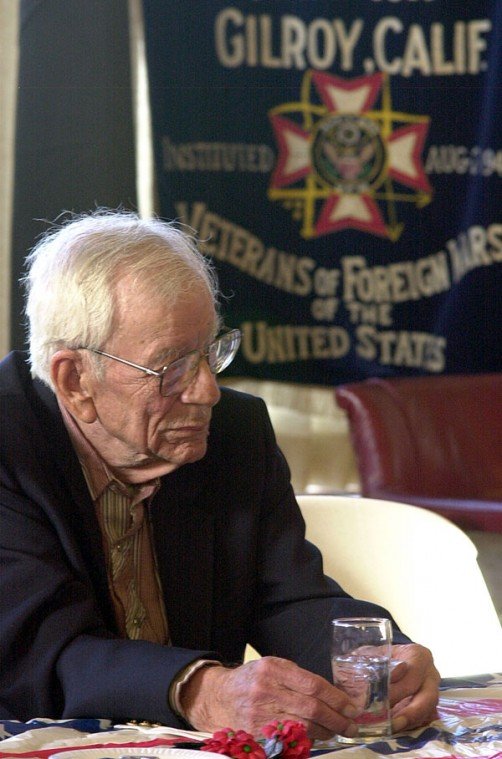GILROY
– When a local group of World War II veterans got together for a
63-year reunion recently at Gilroy’s veterans post, it wasn’t war
that was on their minds.
GILROY – When a local group of World War II veterans got together for a 63-year reunion recently at Gilroy’s veterans post, it wasn’t war that was on their minds.
There was no talk about Saddam Hussein. No talk about President George W. Bush. And no talk of the possible attack on Iraq. Not even North Korea or Osama bin Laden got much play.
“We talked about other things,” said Ray Cadei, 88, who was a motorized messenger during the war for Company B. “We talk about stuff in (our lives) right now.”
Although war wasn’t on these men’s minds that day, it is lying heavy on the minds of other Gilroyans and local veterans Monday, after President George Bush gave Saddam Hussein a final ultimatum to leave Iraq or face a U.S.-led war. As the nation and the world splits even more on its resolve to send bombs and troops into Iraq, the heavy thoughts don’t figure to subside any time soon.
City Councilman Bob Dillon, who served in Vietnam and did battle during Tet offensive of 1968, is seeing too many similarities between the ultimately disastrous war effort then and what is going on now.
“I served in an undeclared war and it wasn’t pleasant. The similarities are depressing,” Dillon said. “But don’t get me wrong, if this was a just world, Saddam would be dead.”
Even Cadei admits he has strong feelings about attacking Iraq.
“I’m against it. I don’t like wars,” Cadei said. “I don’t think it’s right.”
Many would expect veterans like Cadei to lean toward the ouster of whom some consider the new Hitler. But his sentiments represent the views of other Company B vets, says Eleanor Frusetta, Chairman of Reservations for the group and also a Veteran of Foreign Wars LadiesAuxiliary member.
“None of them feels that if somebody is going to attack us we (should be attacking) them,” Frusetta said. “We’d prefer there’d be no war.”
Even though the veterans didn’t talk about the possibility of the United States going to war or any other current events at their reunion, Frusetta said she knows the veterans pretty well from talking with them at the reunions for so many years.
The group, whose members are from Gilroy, Salinas, Watsonville and San Juan Bautista, have been getting together every year since about 1950 – five years after they returned from the war.
Not far from the Veterans’ Hall in Gilroy, a group of black-clad women still gather each Friday to silently support peace. The group, called Women in Black, is an international organization begun by Palestinian and Israeli women searching for a peaceful resolution to conflicts in those countries.
What began as a three- and four-woman vigil has grown in recent weeks into a line up of as many as a dozen women on Sixth Street outside the Gilroy Public Library.
But for every Cadei or Women in Black member, there seems to be a Roland Velasco, too. Velasco, a Gilroy City Council member like Dillon and an armed forces veteran, believes a pre-emptive U.S. invasion of Iraq is the right path.
“I believe the past policies of containment haven’t worked when it comes to Saddam Hussein, and I think it’s about time we do something about it,” Velasco said.
Velasco said that right now his thoughts are mostly with the military men and women as they prepare to go into battle. The former soldier never took part in battle, but Velasco is familiar with the desert region troops are setting up in. His first two years in the service, Velasco did intelligence gathering in the Middle East, specifically analyzing desert geography and how it plays into battle scenarios.
“I can tell you these men and women will be well-prepared and well-trained,” Velasco said. “I’m also confident the U.S. has an exit strategy to bring these soldiers home so there isn’t another Vietnam.”
It’s not hard for Dillon to know exactly what U.S. soldiers in Iraq will be going through once bombs start dropping.
“Juxtapose boredom and terror and you have the mindset of a soldier,” Dillon said. “You have hours of boredom and moments of terror. It’s so important to have the right training.”
It’s important, Dillon and Velasco said, not only because training helps soldiers stay focused in those moments of terror, but because it occupies the mind during the hours of boredom, too.
Gilroy institutions have stayed away from endorsing a pro- or anti-war stance, although the County of Santa Clara passed a resolution opposing a pre-emptive strike on Iraq.
At Gavilan College, weekly vigils are being held on Wednesday afternoons, the first one drawing more than 100 faculty and students. The school characterizes the vigils, which include a moment of silence, as open to all views.
“It’s hard to say what the preponderance of opinion is on campus but there is a a lot of concern,” Gavilan spokesperson Jan Bernstein Chargin said. “There is fear for loved ones, a lot of people know someone who has been or might be deployed. Of course there are people here very much opposed to war, but there are supporters too.”
Andrew Bollinger contributed to this report














